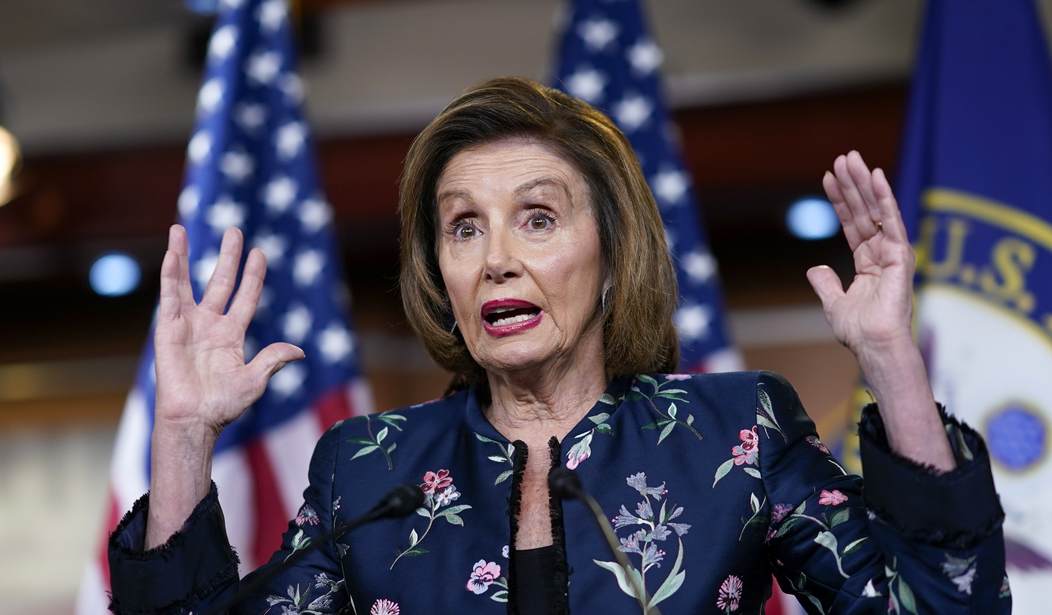Good question. Apparently not even Joe Manchin knows for sure, although it certainly appears to be a lot less than in reconciliation negotiations up until last night. Politico’s Nicholas Wu asked Nancy Pelosi for comment on Manchin’s sudden demands to remove climate-change spending and tax hikes from the rump Build Back Better plan, and Pelosi replied that she wants some answers from Chuck Schumer:
Speaker Pelosi tells me and @elwasson that she doesn't have a comment on reconciliation right now, but she's going to talk to Schumer.
"I would be very, of course disappointed if the whole saving the planet is out of the bill, but I'll find out and then I'll have a statement"
— Nicholas Wu (@nicholaswu12) July 15, 2022
Manchin claimed later this morning that the Washington Post report misrepresented his position. He’s not necessarily opposed to the climate change and tax hike provisions being in the reconciliation bill, but just opposed to doing them now. If Schumer wants a reconciliation bill immediately, Manchin wants those provisions out, but Manchin says he wants one more month of inflation data to see whether the economy has cooled down enough for those costly programs if Schumer insists on keeping them in the package:
MANCHIN says he told Schumer if this needs to get done in july, do Medicare and ACA. He calls July a "political deadline"
— Jake Sherman (@JakeSherman) July 15, 2022
Manchin says on @HoppyKercheval that he told Schumer he wouldn't agree on a reconciliation bill until he saw July inflation numbers
"Can't we wait to make sure that we do nothing to add to that?"
"I'm not going to do something and overreach that causes more problems"
— Burgess Everett (@burgessev) July 15, 2022
"I don't know why they did that," Manchin says of Dems telling reporters Manchin is rejecting energy/taxes.
Says he thought it might have been to put "pressure" on him.
To be fair, Dems needed to make a decision sometime this month.
— Burgess Everett (@burgessev) July 15, 2022
Why the deadline? For one thing, the Senate will be out of session for most of August, and when they come back after Labor Day, they will have to work on next year’s budget. More importantly, though, the reconciliation vehicle will expire on September 30 with the FY2022 budget resolution. If Manchin agrees to a reconciliation bill during the August recess after July’s CPI and PPI reports come out, the Senate might have enough time to pass it — theoretically, anyway.
The House might have other ideas, though. Progressives in the lower chamber had already begun signaling their displeasure with Manchin’s diktats even before his latest change:
But to reach a quick deal on either bill, House Democrats may have to, once again, rubber-stamp a Senate-passed deal — a longstanding frustration in the lower chamber exacerbated by the realities of their 50-50 majority across the Capitol. The narrow parameters of that possible deal acquired crystal clarity Thursday night when Sen. Joe Manchin (D-W.Va.) said he wouldn’t accept climate or tax provisions.
And if House Democrats are working through the stages of grief over the likely loss of their own long-held legislative goals, most haven’t reached acceptance.
“It’s very tough if the Senate finishes something and it comes over here. It takes away a lot of leverage. It makes it sort of a yes-no question, versus a ‘what more can we get?’ question,” Congressional Progressive Caucus Chair Rep. Pramila Jayapal (D-Wash.) said in an interview before Manchin’s rejection of climate and tax language. “There’s always the ‘no’ option. That is the ultimate leverage.” …
Even before Manchin balked, a group of about a half-dozen House moderates watching the talks from afar were increasingly distrustful of how the Senate would handle tax provisions. Several have privately discussed counteroffers they could make to any Senate deal.
“I’m part of a group that has had discussions about alternatives to what might be coming,” said Rep. Dean Phillips (D-Minn.). He added that he’s “not taking any positions,” except that he wants a middle-income tax cut in the measure, and at the least a minimum tax on the largest corporations.
All of that is well and good — at least from Democrats’ perspective — but it will need to get codified, scored by the CBO, and then submitted to the Senate parliamentarian. And that all depends on whether Manchin’s eventual agreement can carry all of the other 49 Senate Democrats first, who are unlikely to be enthusiastic about a bill that represents one percent of their original Build Back Better vision.
That’s a pretty big lift for a congressional session of roughly three and a half weeks before the reconciliation vehicle expires altogether. And all of that is predicated on the idea that inflation will recede rapidly enough to make Manchin comfortable with a big-spending bill. How likely would that be? Once again, let’s look at the track of CPI inflation over the past year:

The trend is so bad that the Fed’s 2.0% target doesn’t even show up on the official BLS chart for CPI inflation any more. You’d have to expect at least the core-CPI line to plunge somewhere below the bottom boundary in the very next set of data points. How likely is that when producer-price inflation looks like this?

The price inflation on goods in the distribution chain for final demand rose 2.5% in a single month. It went up 18% year on year. The chances of that hitting a target rate of 2% are roughly equivalent to me hitting the Powerball over the weekend — between slim and none, and leaning heavily to none.
In other words, Schumer has almost no hope of moving Manchin off this position by waiting a month. That’s why Manchin’s offering to support a small package relating to ObamaCare subsidies and the Medicare drug-pricing proposals — and why Schumer may have no choice but to take it.







Join the conversation as a VIP Member